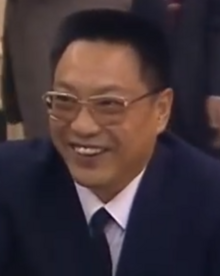

Deng Pufang
| |
|---|---|

Deng in 1987
| |
| Vice Chairman of the Chinese People's Political Consultative Conference | |
| In office 5 March 2008 – 5 March 2013 | |
| Chairman | Jia Qinglin |
| Chairman of the China Disabled Persons' Federation | |
| In office 1988–2008 | |
| Succeeded by | Zhang Haidi |
| Personal details | |
| Born | (1944-04-16) 16 April 1944 (age 80) |
| Parent(s) | Deng Xiaoping Zhuo Lin |
| Relatives | siblings: Deng Lin Deng Nan Deng Rong Deng Zhifang |
| Alma mater | Peking University |
| |
Deng Pufang (simplified Chinese: 邓朴方; traditional Chinese: 鄧樸方; pinyin: Dèng Pǔfāng) (born 16 April 1944) is a Chinese politician, who is the eldest son of former Chinese paramount leader Deng Xiaoping.[1] He is mostly known for being injured during the Cultural Revolution by the Red Guards and becoming a paraplegic. He has since dedicated his life to improving the rights of people with disabilities.[2]
Deng Pufang was born to Deng Xiaoping[3] and Zhuo Lin, his third wife, in Zuoquan, Jinzhong, Shanxi.

During the Cultural Revolution, Deng Xiaoping and his family were targeted by Mao Zedong. He was branded as a capitalist roader.[1] In one session, he was forced to kneel to the ground with his arm stretched out behind him and over his head. His family watched as the students forced him to confess to capitalist ways of thinking.[4]
Mao's Red Guards then imprisoned Deng Pufang. He was tortured and thrown out of the window of a three-story building at Peking University in 1968, but some sources[who?] said he may have fallen or jumped out of the window himself.[1][2][4][5] His back broken, he was rushed to the hospital, but was denied admission. By the time he reached another clinic, he was paralyzed.[4] He remains a paraplegic, using a wheelchair.[1][2]
With regard to his views on the Cultural Revolution, Deng Pufang once said, "The generation of the Cultural Revolution is in no sense a lost generation, as is often said. Quite to the contrary. All those who passed through that testing have been toughened. These people think a great deal, and have their own ideas. They are firm in their convictions, and show initiative. To my way of thinking this generation represents a trump card for China and for the reforms which they have set in motion."[6]
In 1984 Deng Pufang established the China Welfare Fund for the Disabled. Then, he founded and became the chairman of the China Disabled Persons' Federation in 1988.[1]
In 1987, he was the prime mover behind a national survey for people with disabilities.[1] Deng also visited the United States to publicize the challenges of disabled people in China and learn about relevant practices in the United States.[3]
In 1990, he led the formation of the Chinese Rehabilitation and Research Association for the Mentally Disabled. In 1991, legislation was passed to recognize mental illness as a disability.[1]
He was awarded the United Nations Human Rights Prize in December 2003 for his work in protecting the rights of individuals with disability in China.[7]
The International Paralympic Committee awarded Deng the Paralympic Order at their November 2005 meeting in Beijing.[citation needed]It was the first year the award was offered to one recipient only; in the past, gold, silver, and bronze medals were awarded.[citation needed]
Deng also helped organize the 2008 Beijing Olympics as the executive president of the Beijing Organizing Committee.[8]
| International |
|
|---|---|
| National |
|